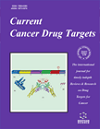
Full text loading...
Apatinib, a tyrosine-kinase inhibitor that targets the vascular endothelial growth factor receptor 2, contributes to the inhibition of angiogenesis. Vinorelbine, a semisynthetic vinca alkaloid, primarily inhibits metaphase mitosis of cancer cells through its interactions with tubulin. This study aimed to evaluate whether apatinib combined with vinorelbine was effective and safe for refractory human epidermal growth factor receptor 2 (HER2)-negative breast cancer patients who failed taxanes and/or anthracycline and analyze the possible mechanism of drug resistance through metabolomic analysis.
Eligible patients were HER2-negative, inoperable, locally advanced, or metastatic breast cancer patients who progressed after at least one chemotherapy regimen in this present prospective phase II study. Patients took oral apatinib (250-500 mg/day) plus intravenous infusion of vinorelbine (25 mg/m2 on day 1, day 8 at 3-week intervals). Objective response rate (ORR) was our primary endpoint, while disease control rate (DCR), overall survival (OS), progression-free survival (PFS), and toxicity were our secondary endpoints. The exploratory purpose was to identify biomarkers or drug resistance mechanisms through metabolomics changes before and after the combination therapy.
Between September, 2019 and June, 2022, a total of 34 patients were included. ORR and DCR were 32.4% (11/34) and 85.3% (29/34), respectively. The median PFS was 5.0 months (95% CI, 3.766-6.234), while the median OS was 13.0 months (95% CI, 8.714-17.286). Side effects included hematologic toxicity, gastrointestinal reaction, and sinus tachycardia, which were mild to moderate. The mainly disturbed metabolic pathways were the cAMP signaling pathway, the alanine/aspartate/glutamate metabolism, the central carbon metabolism in cancer, the beta-alanine metabolism, the butanoate metabolism, and the glyoxylate and dicarboxylate metabolism, which may lead to the resistance of patients to this combination therapy.
Apatinib combined with vinorelbine is effective and safe in patients with locally advanced or metastatic refractory HER2-negative breast cancer. The findings of this study contribute to a better understanding of the metabolic effect of apatinib and vinorelbine therapy.
ChiCTR1900025659.

Article metrics loading...

Full text loading...
References


Data & Media loading...
Supplements

